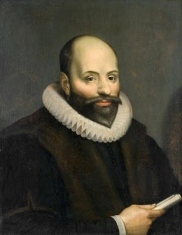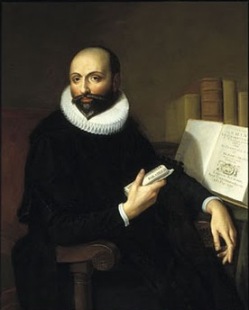Biographical Sketch on Jacobus Arminius
(Jacob Hermansen)
by Daniel Hollenbeck, Biola University

Summary of life
October 10 1559-October 19 1609
- Born on October 10, 1559(60?) in Oudewater, Utrecht, Holland.
- His father died a few years after he was born, leaving his mother a widow with three small children.
- Theodorus Aemilius brought Jacob under his wing and taught him until he was old enough to go to school, at which point he sent the boy to Utrecht for deeper instruction in 1570.
- Aemilius dies in 1574 and another friend comes to aid his education, Rudolphus Snellius, who would soon become a professor at the University of Leiden in Marburg.
- Sometime around the beginning of his studies his town is overrun by the Spanish who lay waste to it. Jacob returns to his town to see that his mother, brother, and sister are among the massacred.
- Snellius invites Jacob to study at Leiden, whose university had only opened the year previous, and Jacob readily accepts.
- He studies there for six years, starting as a liberal arts student which opens the door to study theology where he would make his greatest mark.
- In early 1582 Jacob is given a grant from the Amsterdam merchant guild, provided he promises to lead the church in Amsterdam after he had finished school, and leaves to finish his studies under Theodore Beza in Geneva. Later in 1582 he headed to Basel for three years to study on his own but heads back to Geneva again.
- Back in Geneva he meets Johannes Wtenbogaert who would be a great ally in his future discussions.
- He takes some time off to go to Italy to study in Padua.
- Jacob clearly had good relations with Beza who writes back to the Amsterdam merchant guild, “God has gifted him with an apt intellect both as respects the appreciation and the discrimination of things. If this henceforward be regulated by piety, … it cannot but happen that this power of intellect, … will be productive to the richest fruits.”[1]
- In 1588 he finishes his schooling and heads back to Amsterdam to fulfill his promise. Two years later he marries Lijsbet Reael in 1590.
- 1589: The Ecclesiastical Senate of Amsterdam asks Jacob to refute the teachings of Dirck Volckertszoon Coornhert, an outspoken opponent to Calvin’s predestination, justification, and capital punishment of heretics.
- He becomes known as a good preacher and a faithful pastor to his congregation.
- 1603 he becomes a professor of theology at Leiden and holds the office until the time of his death in 1609.
- 1604 begins a series of debates and public instances with Goramus. He had been at Leiden since 1594 and was described as “a rather mediocre scholar” but “a forceful defender of the Calvinist doctrine”.
- These debates quickly escalated until there was a definite split between the professors and theologians with some remaining with Calvin’s theology and others turning and siding with Jacob.
Influence and recognition
- Obviously there would be no Arminian without Aemilius and Snellius. The former took the poor widow’s son and gave him an education that would have been too far to reach given the tragedy that befell his family. The latter furthered that education which led him to meet many important theologians and even got him an apprenticeship under Beza.
- Johann Kolmann was another one of Jacob’s teachers at Leiden and he believed and taught “high Calvinism made God both a tyrant and an executioner”.[2]
- Dirck Volckertszoon Coornhert, who Jacob was asked to refute in 1589, actually led him to consider well the topic at hand. After short consideration, Jacob found that DVC was right in his summation but he would not submit a formal written work until he had more time to consult the Scriptures, early church fathers, and other divines.
- From this study and subsequent teachings, Jacob adopted the theology that bears his name to this day.
- To come up with a theological point that goes directly against someone else’s views, that someone had to have had a large impact on your life. Not only did Jacob eventually come out against Calvinism, but he was raised in a Calvinist society. All but a few of his teachers were hardcore Calvinists and he even taught and preached with a Calvinist leaning until the last decade of his life.
- The entirety of theological stances that would become Arminianism would not fully come together until after his death. In 1610, only a year after his death, the “Five Articles of Remonstrance” was originally articulated. This was not a work of one or two of Jacob’s students, but rather 45 ministers who turned it in to the State General of the Netherlands for inspection. These men and their followers became known as Remonstrators. This treatise on Arminianism, like its counterpart Calvinism, has five points
- God wished to reconcile all men unto himself and therefore sent Jesus Christ his son to die and three days later raised him up that whosoever believes in him will have eternal life. This means that anyone who believes in Jesus, through the grace of the Holy Spirit, will have eternal life. Conversely, anyone who does not put their faith in Jesus will be condemned on the day of judgment. (John 3:36)
- Jesus Christ’s death was a once and for all sacrifice for all men, for all time. However, this forgiveness can only be enjoyed by the believer. (John 3:16; 1 John 2:2)
- Since the fall man has been subjected to futility and cannot, without aid from the Holy Spirit, do, think, or will anything good. Only after being born again in Christ’s baptism can we act in a way that is pleasing to the Lord. (John 15:5)
- Only through God’s initial grace can we begin to do, think, or will anything good, and through his continued grace can we continue these things, yet this grace can be rejected. (Acts 7)
- There is continued grace and persistent leading of the Holy Spirit so that no Christian should be led astray except through their own changing of direction. The power of God’s grace is such that no plans of man or Satan could ever be able to take the believer out of the hand of God. (John 10:28) Whether or not someone can permanently leave their faith, walk back into their life of darkness, and fall from grace is not yet known from the Scriptures.
- Less than a decade after the ministers formed the Remonstrance, a multinational Synod of Dort was convened to determine whether or not Jacob’s teachings and, by extension, these ministers and their teachings were heretical or not. The Synod agreed unanimously that these teachings could not be reconciled with Scripture and these were deemed heretical by the state church. Not only that, the 13 ministers that were the spokesmen for the others were told to abstain from ministerial activities such as preaching, exhorting, administering the sacraments, and visiting the sick. Furthermore, Episcopius was commanded not to write letters or books promoting the doctrines of the Remonstrants.
Works
- Being a full time pastor for over a decade and speaking twice a week means that most of Jacob’s works are sermons that have been lost.
- Apart from sermons he mostly wrote treatises, articles, and letters which he probably never thought anyone would read besides the recipient. A large portion of his works that provide much insight into his life are his public disputations and discussions with others. These were not written by him but rather taken down by listeners at these discussions.
- Major work: His most famous work is his Declaration of Sentiments which covers all that he knew and believed about predestination and his arguments against it. He not only says that the Calvinist interpretation of predestination is wrong, it is also against the Scripture and the Gospel.
Originally written in Dutch - Gunter, W. Stephen. Arminius and his Declaration of sentiments: an annotated translation with introduction and theological commentary. Waco, TX: Baylor University Press, 2012.
Secondary Sources
Arminius, Jacobus. Arminius speaks: essential writings on predestination, free will, and the nature of God. Edited by John D. Wagner. Eugene, Or.: Wipf & Stock, 2011.
Boer, William Den., and Albert Gootjes. God’s twofold love: the theology of Jacob Arminius (1559-1609). Göttingen: Vandenhoeck & Ruprecht, 2010.
Brian, Rustin E. Jacob Arminius: the man from oudewater. Eugene, OR: Cascade Books, 2015.
Leeuwen, Theodoor Marius van, Keith D. Stanglin, and Marijke Tolsma. Arminius, Arminianism, and Europe: Jacobus Arminius (1559-60-1609). Leiden: Brill, 2009.
Nichols, James, and W. R. Bagnall, trans. The writings of James Arminius. Grand Rapids, MI: Baker Book House, 1956.
Stanglin, Keith D. The missing public disputations of Jacobus Arminius: introduction, text, and notes. Leiden: Brill, 2010.
Bibliography
Arminius, Jacobus. Arminius speaks: essential writings on predestination, free will, and the nature of God. Edited by John D. Wagner. Eugene, Or.: Wipf & Stock, 2011.
Boer, William Den., and Albert Gootjes. God’s twofold love: the theology of Jacob Arminius (1559-1609). Göttingen: Vandenhoeck & Ruprecht, 2010.
Brian, Rustin E. Jacob Arminius: the man from oudewater. Eugene, OR: Cascade Books, 2015.
Gunter, W. Stephen. Arminius and his Declaration of sentiments: an annotated translation with introduction and theological commentary. Waco, TX: Baylor University Press, 2012.
Leeuwen, Theodoor Marius van, Keith D. Stanglin, and Marijke Tolsma. Arminius, Arminianism, and Europe: Jacobus Arminius (1559-60-1609). Leiden: Brill, 2009.
Nichols, James, and W. R. Bagnall, trans. The writings of James Arminius. Grand Rapids, MI: Baker Book House, 1956.
Stanglin, Keith D. The missing public disputations of Jacobus Arminius: introduction, text, and notes. Leiden: Brill, 2010.
End Notes
[1] Leeuwen, Theodoor Marius van, Keith D. Stanglin, and Marijke Tolsma. Arminius, Arminianism, and Europe: Jacobus Arminius (1559-60-1609). Leiden: Brill, 2009.
[2] Arminius, Jacobus. Arminius speaks: essential writings on predestination, free will, and the nature of God. Edited by John D. Wagner. Eugene, Or.: Wipf & Stock, 2011.
